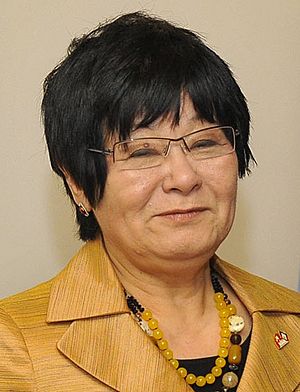Bev Oda facts for kids
Quick facts for kids
Bev Oda
|
|
|---|---|

Oda in 2011
|
|
| Minister for International Cooperation | |
| In office August 14, 2007 – July 4, 2012 |
|
| Prime Minister | Stephen Harper |
| Preceded by | Josée Verner |
| Succeeded by | Julian Fantino |
| Minister of Canadian Heritage and Status of Women | |
| In office February 6, 2006 – August 14, 2007 |
|
| Prime Minister | Stephen Harper |
| Preceded by | Liza Frulla (Canadian Heritage) |
| Succeeded by | Josée Verner |
| Member of Parliament for Durham |
|
| In office June 28, 2004 – July 31, 2012 |
|
| Preceded by | Alex Shepherd |
| Succeeded by | Erin O'Toole |
| Personal details | |
| Born |
Beverley Joan Oda
July 27, 1944 Thunder Bay, Ontario, Canada |
| Political party | Conservative |
| Domestic partner |
Don MacPherson
(died 1998) |
| Residences | Orono, Ontario, Canada |
| Alma mater | University of Toronto Lakeshore Teachers College |
| Profession | Broadcasting executive, communication consultant, teacher |
Beverley Joan "Bev" Oda (born July 27, 1944) is a retired Canadian politician. She made history as the first Japanese-Canadian person to become a Member of Parliament (MP) and a Cabinet Minister in Canada. She represented the area of Durham for the Conservative Party of Canada.
Bev Oda served as the Minister of Canadian Heritage and Status of Women starting in February 2006. Later, in August 2007, she became the Minister for International Cooperation. She stepped down from her roles in July 2012 after some public discussions about her expenses.
Contents
Bev Oda's Early Life & Education
Bev Oda was born in Thunder Bay, Ontario. Her family has a unique history in Canada. Her mother was part of the Japanese Canadian internment during World War II, which meant she was held in a special camp. Her father worked on a sugar beet farm in southwestern Ontario.
Bev Oda earned a Bachelor of Arts degree from the University of Toronto. She also studied at Lakeshore Teacher's College. For many years, she lived in Mississauga, Ontario and worked as a teacher in local schools. In 1999, she moved to Orono, Ontario.
Her Career in Broadcasting
Bev Oda started her career in broadcasting in 1973 at TVOntario. She then worked for other well-known television networks like Citytv and the Global Television Network.
- She was a member of the Ontario Film Review Board from 1986 to 1987.
- From 1987 to 1993, she was a Commissioner for the Canadian Radio-television and Telecommunications Commission (CRTC). The CRTC helps regulate broadcasting and telecommunications in Canada.
- She became the Chair of FUND (now called The Harold Greenberg Fund) in 1994. This fund helps support Canadian film and television projects.
- From 1995 to 1999, she was a Senior Vice-President at CTV and Baton Broadcasting.
- In 2003, she was recognized for her work and inducted into the Canadian Association of Broadcasters Hall of Fame. She also received The Queen's Golden Jubilee Medal.
- She also worked as an advisor for three different Secretaries of State, who are government ministers.
Becoming a Member of Parliament & Cabinet Minister
Bev Oda volunteered for many years with the Progressive Conservative Party. In the 2004 Canadian federal election, she ran as a Conservative candidate in the area of Clarington—Scugog—Uxbridge. She won the election by a small number of votes.
Her Role as a Critic
After being elected, Bev Oda became the Conservative Party's "critic" for the Ministry of Heritage. This means she was responsible for watching and commenting on the government's actions related to Canadian culture and heritage. She believed there should be more choices for Canadian and international TV shows and movies in the country.
Recognizing Chinese Canadians
In November 2004, Bev Oda brought forward a bill called the Chinese Canadian Recognition and Redress Act. This bill asked the Canadian Parliament to recognize the important contributions of Chinese immigrants to Canada. It also aimed to acknowledge the unfair treatment Chinese Canadians faced in the past because of racist laws. Even though Bev Oda is of Japanese heritage, not Chinese, she championed this important cause.
Re-election and Cabinet Role
In the 2006 Canadian federal election, she was re-elected in her riding of Durham. On February 6, 2006, Bev Oda was sworn in as the Heritage Minister in the new Conservative government led by Prime Minister Stephen Harper. This made her the first Japanese-Canadian person to become a Cabinet Minister in Canada's history.
Minister for International Cooperation
On August 14, 2007, Bev Oda was appointed the Minister of International Cooperation. In this role, she was in charge of Canada's efforts to help other countries through the Canadian International Development Agency (CIDA).
- She worked on making Canada's international aid more effective, focused, and accountable.
- She was also responsible for Canada's part in the Muskoka Initiative. This was a global effort to reduce the number of mothers and babies who die during childbirth and to improve their health in the world's poorest countries.
Bev Oda was re-elected by a large number of votes in both the 2008 Canadian federal election and the 2011 Canadian federal election.
Resignation from Politics
On July 3, 2012, Bev Oda announced that she would resign from her position as a Cabinet member and as an MP, with her resignation becoming official on July 31.
See also
- List of visible minority Canadian cabinet ministers
- List of visible minority politicians in Canada

